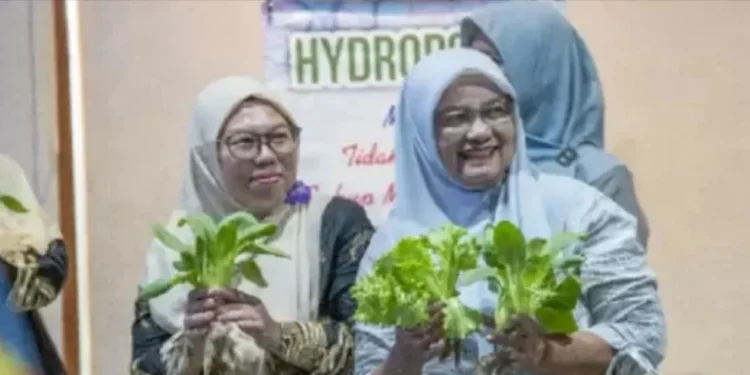On June 5, 2024, the community from 18 neighborhoods adjacent to the Krakatau Industrial Area in Cilegon, Banten, attended a hydroponic farming training workshop. Organized by PT Krakatau Sarana Properti (KSP), the event focused on “Hydroponic Training as a Means of Agriculture on Limited Land,” aiming to strengthen food security and generate additional income for local residents.
The workshop was inaugurated by Nia Ninfa Novia, Director of Finance and HR at KSP, who praised the participants and highlighted the company’s commitment to community engagement. “This initiative demonstrates our dedication to not just other CSR social issues but also to being present within the community by offering various training programs. We aim for the residents, especially those near the Krakatau Industrial Area, to sustain their activities effectively,” said Novia.
Following the training, participants were encouraged to apply their new skills directly, benefiting both themselves and their communities. “Hydroponic farming teaches us how to grow crops without needing large tracts of land. We hope this training will foster a new generation of millennial hydroponic farmers in Cilegon and surrounding areas,” Novia added. She also expressed optimism about the positive economic impact on residents practicing hydroponic farming.
Anis Fuad Salam, owner of Hydro Fans Serang, detailed the numerous advantages of hydroponic farming for the community near the Krakatau Industrial Area. Hydroponic systems use up to 90% less water than traditional soil-based agriculture, which is particularly beneficial in areas with limited water resources. Additionally, hydroponics can produce yields up to three times higher than conventional farming, providing a more reliable and efficient method of crop production.
A recent report by the United Nations Food and Agriculture Organization (FAO) supports the effectiveness of hydroponic farming in urban areas, emphasizing its potential to improve food security and resilience in densely populated regions. By implementing hydroponic systems, communities can ensure a consistent supply of fresh vegetables and herbs, which are essential for a balanced diet.
The training covered various aspects of hydroponic farming, including system setup, nutrient management, and pest control. Participants learned to create and maintain hydroponic systems tailored to their specific needs and environmental conditions. This hands-on approach empowered them to independently cultivate crops, thus reducing their dependence on external food sources and enhancing local food sovereignty.
Moreover, hydroponic farming offers significant economic benefits. By producing high-value crops such as lettuce, spinach, and herbs, farmers can achieve higher market prices compared to traditional farming methods. This additional income can improve the overall living standards of local families and stimulate economic growth within the community.
The hydroponic farming training initiative by KSP marks a significant step towards sustainable agriculture and economic empowerment in Cilegon. By equipping residents with the skills to utilize hydroponic systems, the program not only addresses food security challenges but also provides a viable means of income generation. This model of community engagement and innovative agricultural practice can serve as a blueprint for other regions aiming to enhance their food security and economic resilience.












